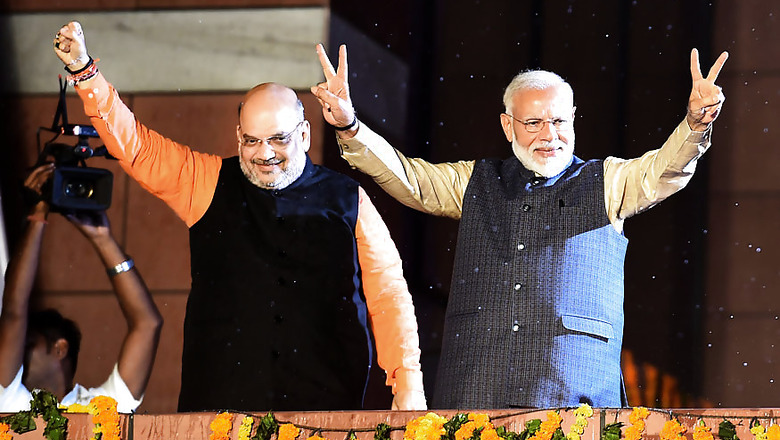
views
New Delhi: Seven decades after Independence, India on Tuesday ended Jammu and Kashmir’s semi-autonomy and scrapped the special status accorded to it as the Parliament on Tuesday approved amendments to Article 370 of the Constitution.
Amidst confusion and disarray in the opposition ranks, the Lok Sabha also passed a bill to divide the state into two separate union territories – J&K and Ladakh - by a three-fourth majority.
The government had already bagged the requisite statutory nod from the Rajya Sabha on Monday; and new laws will come into effect once the gazette notification is issued with ascent from the President of India.
In a move marked with vintage precision and shrouded in secrecy till the last moment, the government succeeded in wrapping up the entire process in Parliament within 36 hours of its introduction in the Rajya Sabha.
The immediate implications of the move in the restive Kashmir Valley remain unknown as the region remains an information black hole after the government severed all communication on Sunday night to prevent unrest.
“Curfew is imposed in the state only to maintain law and order. Kashmiri’s are our own. We will embrace them and speak to them. But some hard decisions had to be taken,” home minister Amit Shah told Lok Sabha while replying to the debate.
The government’s move will bring several changes to the region, as it will lose all the powers of the constitution that gave Jammu and Kashmir a special status and exclusive rights to its permanent residents to properties there.
“This is a historic moment India. What we're discussing today will impact generations. This resolution will ensure that Jammu and Kashmir will remain with India forever," Shah said.
According to the new legislation, Jammu and Kashmir will become a centrally-ruled union territory with a legislature that will have limited powers. Once done, people from across the country will be able to settle down in the region. The step is likely to end up changing demography of the state.
Ladakh will be the second union territory which will not have its own legislature and will be ruled directly by the central government.
The home minister reassured on Tuesday that the union territory status of Jammu and Kashmir will be temporary and it will be given statehood again once the situation improves. Taunting the
Congress for the delay in repealing special status, he said the BJP will not take 70 years to fulfil its commitment.
Former Congress chief Rahul Gandhi criticised the "unilateral" measure of the government, taken without any consultation with stakeholders from J&K, and tweeted: "National integration isn't furthered by unilaterally tearing apart J&K. This nation is made by its people, not plots of land.”
He said this “abuse of executive power” will have grave implications for our national security and also drew attention to the house arrest of former chief ministers Omar Abdullah and Mehbooba Mufti.
But he was not backed up by many leaders of his own party, including Jyotiraditya Scindia, who minutes before the voting in Lok Sabha, said he supports the government action. “Would have been better if constitutional process had been followed. No questions could have been raised then. Nevertheless, this is in our country’s interest and I support this,” he tweeted.
Amid the internal rift, the Congress had only got support from a handful of parties - the Samajwadi Party, the DMK, Rashtriya Janata Dal and the Left parties – in its opposition to the Kashmir decisions as most of the regional parties sided with the government.
Amid the total clampdown on communication in Kashmir, National Conference leader Farooq Abdullah called the move “absolute dictatorship” and “undemocratic”. “Dictatorial authority has been invoked and not a democratic authority that we thought they will invoke. I don’t know how many have been arrested. Nobody is allowed to come in or go out, we are under house arrest,” he said.
According to government sources, the prohibitory order could be lifted in the Kashmir Valley, at least partially, by Friday. Abdullah said “as soon as the gate will open, our people will be out, we will fight, we'll go to the court.”
One petition has already been filed against the revocation of special status in the Supreme Court and more are likely to follow in the coming days.
The special status of Jammu and Kashmir stemmed from Clause 3 of Article 370, which was key to J&K’s accession to India. The Article gave Kashmir its own Constitution and specified that except for Defence, Foreign Affairs, Communications and ancillary matters (matters specified in the Instrument of Accession), the Indian Parliament needs the state government's concurrence for applying all other laws.
Thus, the state's residents lived under a separate set of laws, including those related to citizenship, ownership of property, and fundamental rights, as compared to other Indians.
The decisive strike against Article 370, and by extension Article 35A as well, within 100 days of PM Narendra Modi’s re-election, came against the backdrop of a massive deployment of security forces to deal with possible protests and any attempts by Pakistan to fan trouble.
The move surpassed all estimates of what the government was up to as few in the political class expected the audacious move to end J&K’s special status till even Monday morning. Most had braced for a repeal of Article 35-A, but not more.
This was achieved via a presidential order.
The Article 370 stated that changes to it through a presidential order could only be done in consultation with the Constituent Assembly of Jammu and Kashmir, which was dissolved after the accession of the state to the Indian Union, thus ensuring its permanence.
But the government, to fulfil its aim, gave authority of the Legislative Assembly to the Governor, and then changed the ‘Constituent Assembly’ to mean ‘Legislative Assembly’, which means that the President issued the order upon the Governor’s recommendation.


















Comments
0 comment